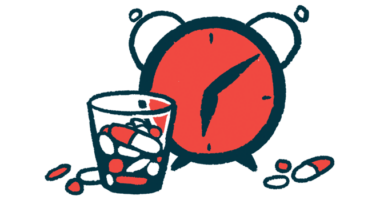After Suffering a Crippling Loss, Keep Going
Take the long view through any problems with hereditary angioedema treatment

He lost the race. Sure, when he stepped in front of the cameras, the commentators announced all of his victories, how many Olympic medals he possessed, and how he’d been a favorite to win, but there he was, in the pool, not coming in second or even fourth, but seventh.
In post-race interviews, Michael Phelps said he knew before the end of the 100-meter freestyle that he would lose. According to his coach, he’d miscalculated the number of strokes it took to get to the wall. That gross underestimation cost him the win and a place on that particular team.
While I hadn’t followed Phelps closely, I became aware of him when he won eight medals at the 2004 Olympics. Before long, his name was synonymous with Olympic gold. Most swimmers entered the race hoping they could at least place second, knowing they were no match for him.
Yet at a 2014 qualifying match, 22 Olympic medals later, he stood stunned and disappointed. Maybe none of his wins or the other qualifying races mattered at that moment. Everyone knew he’d make the team headed to the Olympics, but he was taking that loss to heart.
Losses are harder to process after a win.
After our daughter, whom we lovingly refer to as Ladybug, was diagnosed with hereditary angioedema (HAE) in 2021, I felt like we were about to hit a winning streak. Finally, someone was telling us what we were facing. Finally, we found a doctor who could explain all the symptoms and flares, and he let us know that treatment was out there. Who wouldn’t feel like a winner with news like that?
Unfortunately, I didn’t understand that finding the right treatment for Ladybug would take additional time. I didn’t really grasp that medicine levels had to be just right, growth spurts could ruin that, and sometimes medicines that worked at first could stop working without notice.
When nurses came to our house and trained us to constitute medications and do an at-home, intravenous infusion and subcutaneous injections, I accomplished all of that after just one session. I felt like a champion.
But sometimes, Ladybug’s veins were tough to find, her fear of needles made some injections more complicated, and every once in a while, faulty applicators would make medications challenging to transfer into syringes. I’d celebrate when she went an entire month without missing school, only to be met with another month when I was hoping she could make it through one week.
Before long, it seemed that epic failures were competing with our wins.
As a caregiver for a child with HAE, I know that failures can dampen everyone’s morale. When medicines fail or flares last longer than they should, it feels like a loss. And sometimes, we take those losses harder.
However, even amid what feels like a crippling loss, it helps to remember Phelps on that fateful day. He knew he would lose during the race, and yes, he was still disappointed, but he kept swimming. And although he didn’t make the 100-meter freestyle team, he went on to qualify for other races and ultimately won six additional medals at the 2016 Olympics.
Caregiving can be exhausting, and setbacks in our loved one’s condition can make us feel so much worse. It’s OK if we take a moment to reflect on how disappointed or frustrated we are when things don’t seem to go as we’d hoped. But when we keep going, we can find others to help assess what went wrong and aid us in finding a solution.
All of our wins won’t be gold, and all of our losses won’t be seventh place, but no matter what happens, we need to remember to keep swimming.
Note: Angioedema News is strictly a news and information website about the disease. It does not provide medical advice, diagnosis, or treatment. This content is not intended to be a substitute for professional medical advice, diagnosis, or treatment. Always seek the advice of your physician or other qualified health provider with any questions you may have regarding a medical condition. Never disregard professional medical advice or delay in seeking it because of something you have read on this website. The opinions expressed in this column are not those of Angioedema News or its parent company, Bionews, and are intended to spark discussion about issues pertaining to angioedema.








Leave a comment
Fill in the required fields to post. Your email address will not be published.